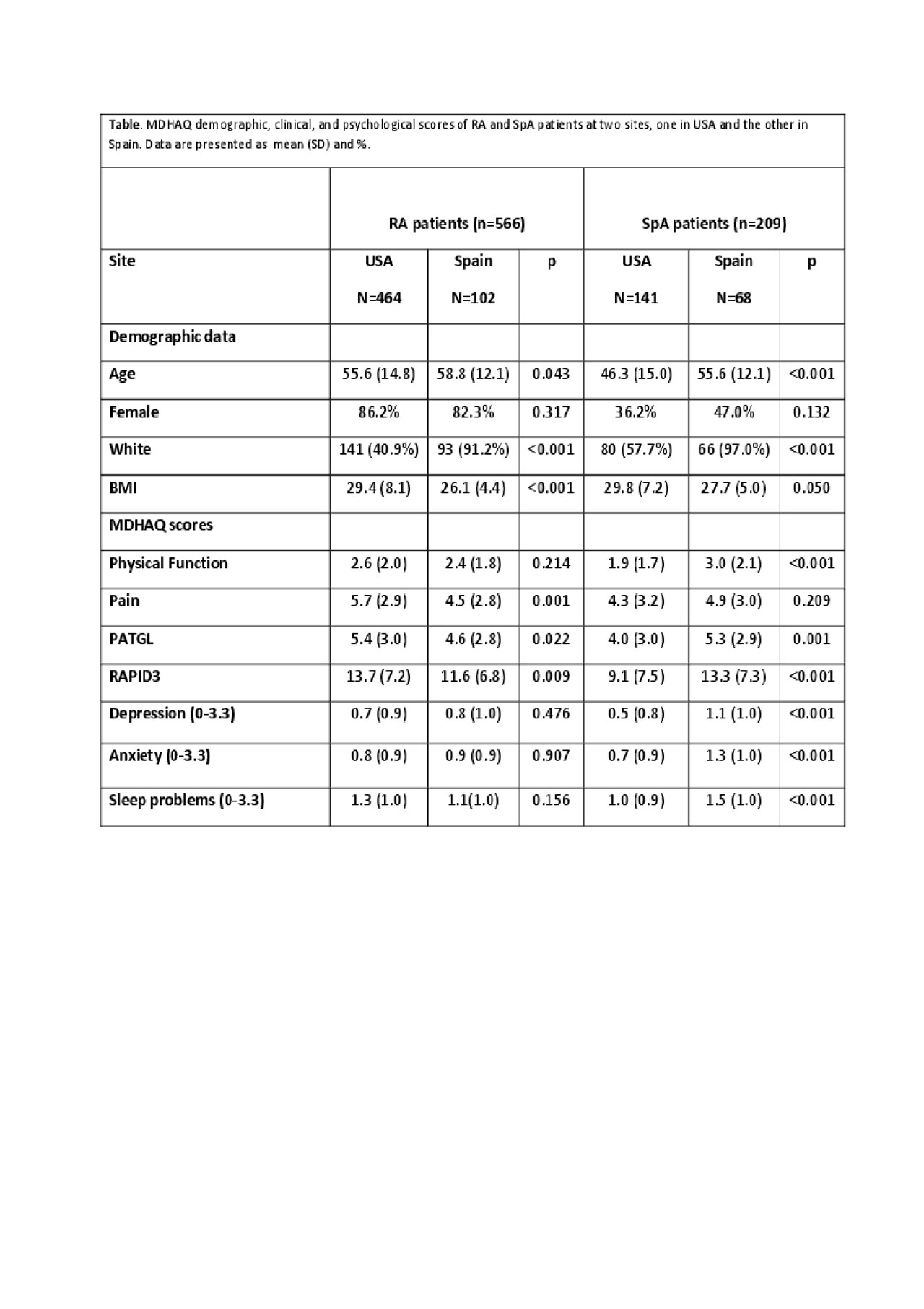Session Information
Date: Sunday, November 10, 2019
Title: Patient Outcomes, Preferences, & Attitudes Poster I: Patient Reported Outcomes
Session Type: Poster Session (Sunday)
Session Time: 9:00AM-11:00AM
Background/Purpose: Associations of depression with clinical status in RA1 and differences in clinical status in different countries2 have been reported. We compared MDHAQ (multidimensional health assessment questionnaire) scores for clinical and psychological status, including RAPID3 (routine assessment of patient index data) and psychological index, in patients with rheumatoid arthritis (RA) or spondyloarthropathies (SpA) at one setting in the USA vs another in Spain.
Methods: The MDHAQ is a 2-page self-report questionnaire, which is completed by all RA and SpA patients before seeing the rheumatologist at certain rheumatology settings, including one in the USA and another in Spain. MDHAQ data in the 2 settings were compared in a cross-sectional study of patients with RA or SpA. The MDHAQ includes 0-10 scores for physical function (FN), visual analogue scales (VAS) for pain (PN), and patient global estimate (PATGL), compiled into 0-30 RAPID3, for which minimum clinically important improvement (MCII) is 3.83. The MDHAQ also includes a 0-10 fatigue VAS, 0-48 RADAI self-reported painful joints count, 0-60 symptom checklist, as well as 3 psychological queries in the traditional patient-friendly HAQ format concerning depression, anxiety, and sleep quality (scores 0 to 3.3). MDHAQ demographic, clinical, and psychological data were compared by diagnostic groups at the 2 settings using Student t-test and Chi2 test.
Results: Among 775 patients with RA or SpA, 605 were from USA, 464 with RA and 141 with SpA, and 170 from Spain, 102 with RA and 68 with SpA (Table). Patients in the USA were younger than in Spain. Patients with RA were 82-86% female, while SpA patients were 36–47% female – no significant sex differences by site. Patients in the USA were 41-58% white versus 91-97% in Spain (Table). Mean BMI was higher in the USA in both diagnoses. MDHAQ clinical variables in RA patients were higher in the USA vs Spain, statistically significant for pain and RAPID3, although the RAPID3 difference in RA of 2.2 (13.7 in the USA versus 11.6 in Spain) did not meet MCII of 3.8. No significant differences in self-report psychological scores were seen in RA patients in the 2 settings. By contrast, in SpA patients, MDHAQ clinical and psychological variables were higher in Spain vs USA (Table). The difference in RAPID3 of 4.2 (13.3 in Spain versus 9.1 in the US) was greater than the MCII, indicating statistical and clinical significance. Statistically significantly poorer status for depression, anxiety and poor sleep quality also was seen in SpA patients in Spain versus USA, similar to differences in clinical scores.
Conclusion: In comparisons of a setting in the USA vs one in Spain, somewhat higher scores were seen for RA patients in the USA for clinical measures, which did not meet criteria for MCII, and no differences were seen in psychological status. In patients with SpA, poorer status was seen in Spain vs the USA in both clinical and psychological MDHAQ measures. The findings are consistent with associations between self-report of depression and RAPID3, and component physical function, pain, patient global assessment scores.
References: 1. Curr Opin Rheumatol 2005; 17:147-152. 2. Arthritis Rheum. 2008; 15:42-50. 3. J Rheumatol 2019;46:27-30.
To cite this abstract in AMA style:
Morlà R, Castellanos R, Ruiz-Esquide V, Ramirez J, Sanmarti R, Gomez-Puerta J, Riad M, Castrejon I, Pincus T. Multidimensional Health Assessment Questionnaire (MDHAQ) Scores in Spain vs USA: Similar Scores for Clinical Status and Self-report of Depression in Rheumatoid Arthritis (RA) but Poorer Scores for Both in Spondyloarthropathies (SpA) in Spain [abstract]. Arthritis Rheumatol. 2019; 71 (suppl 10). https://acrabstracts.org/abstract/multidimensional-health-assessment-questionnaire-mdhaq-scores-in-spain-vs-usa-similar-scores-for-clinical-status-and-self-report-of-depression-in-rheumatoid-arthritis-ra-but-poorer-scores-for-bot/. Accessed .« Back to 2019 ACR/ARP Annual Meeting
ACR Meeting Abstracts - https://acrabstracts.org/abstract/multidimensional-health-assessment-questionnaire-mdhaq-scores-in-spain-vs-usa-similar-scores-for-clinical-status-and-self-report-of-depression-in-rheumatoid-arthritis-ra-but-poorer-scores-for-bot/

